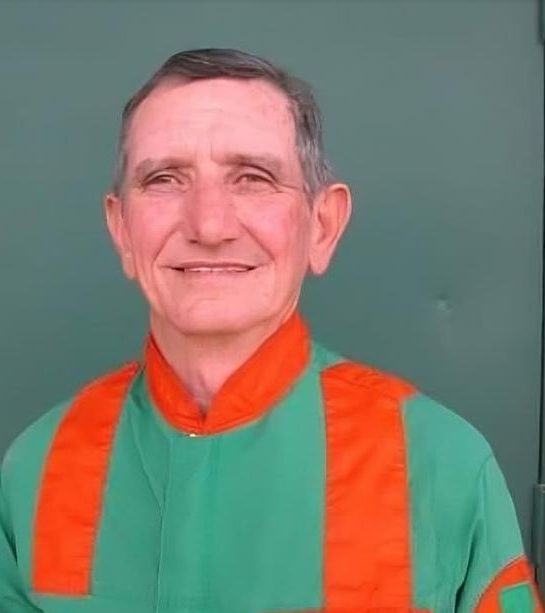Leigh W. Fitch, a Maine harness racing icon whose daring, rail-hugging driving style propelled him to 7,592 victories and more than anyone’s share of driving spills during a 53-year career, died on Oct. 26, 2024, at his home in Sebago, Maine, after a long illness. He was 79.

Born in Portland to parents George E. Fitch and Florence Hutt Fitch and raised in East Sebago, Leigh Fitch grew up in the sport, as his father owned, trained, and drove harness horses while running an insurance business. Fitch was a three-sport athlete, in cross country, basketball, and baseball, at Proctor Academy. Though undersized at 5-foot-4 and 120 pounds, the famously feisty competitor became the starting point guard and captain. As Fitch said in 1996, in a feature story in the trade magazine Hoof Beats, “being short gave me something to overcome. I was the same on the court as I was on the track later on.”
Fitch won his first race on Sept. 1, 1962, at the Windsor (Maine) Fair with the pacer Miss Marie Pointer in 2:12. His last drive was also at Windsor, on Sept. 1, 2015, 53 years and one day after his first win.
Fitch was one of the first great catch drivers in Maine, emerging a few years before Billy Parker Jr. His winningest years were from the late 1970s to the early 1990s, peaking between 1983 and 1994, when his UDR dropped below .300 just once. He earned New England Driver of the Year in 1984 but the best was yet to come. In 1988, he won 472 races from 2,051 drives, primarily at Lewiston Raceway and Scarborough Downs as well as the Maine fairs, good for a UDR of .379 and fifth in the nation in dash victories behind Herve Filion, Walter Case Jr., Jack Moiseyev, and John Campbell.
And it wasn’t easy pickings: 1988 was the year that Case, a rising phenom who grew up in Lewiston, returned to Maine after racing in Chicago. The two drivers ended up winning nearly a quarter of all the races in Maine that year, Case 615 races to Fitch’s 472. It was the year John Campbell’s horses won $11 million; Fitch’s won just over $500,000.
“I idolized him when I was a kid,” said Case, who grew up in Lewiston, in 1996. “He has the fire. He taught me what a winning attitude was all about.”
Just as Stanley Dancer had revolutionized New York racing with an aggressive front-end style, Fitch did the same in the 1960s while driving for his father and owner Chick Atherton. “We’d get down to the half in 1:04 and go a mile in 2:18 but they still couldn’t catch us.”
But speed and the front end were not what made Fitch famous in Maine. Instead, his style was iconoclastic, in keeping with his personality: independent, stubborn, and cagey. “I didn’t want to be like the others. I wanted to be myself.” At a time when the perfect drive was the gentlemanly second-over trip described by Billy Haughton in the harness racing manual Care and Training of the Trotter and Pacer, Fitch’s insurgent style disrupted that model, gaining him the nickname “The Fox.” Rarely flushed off the rail, Fitch instead was often a rail skimmer who mastered the art of anticipating the opening of a seam late in the mile, using athletic reflexes and exquisite timing to feed his horse open racetrack. Fitch once said that “winning was life or death for me,” and his driving style, safe but daring, meant brushes with the latter. It was the era of the wooden hub rail, and any driver working the inside late in the mile needed steely nerves.
In 1996, Fitch estimated that he had been involved in more than 150 accidents in his career. Harness racing columnist Tony Aliberti, writing in the Lewiston Sunday newspaper in 1986, stated that “not a single driver in the history of racing has sustained either the number or magnitude of his driving injuries.” As Fitch liked to say, “I’ve broken just about every bone, some more than once.” In 1984, he cut off a cast himself to get back to driving quicker than doctors suggested.
Indeed, Fitch’s capacity to literally get back on the horse would ultimately define his greatness, and was why fans loved Fitch in his green and orange colors, always on the comeback. He rebounded from personal challenges, including achieving sobriety in 1985, not to mention bruises and broken bones from his many accidents, without losing his nerve or his “stick,” as one fellow driver described Fitch’s mettle.
Shane Bacon is executive director of the Maine Harness Racing Commission. In the 1980s, he was the track announcer at Lewiston Raceway. After Fitch won the track’s dash and UDR title for the fall meet in 1987, Bacon presented Fitch with a life-size trophy. “I have that picture in my office,” said Bacon.
“Calling races with him at the top of his game, one word that comes to mind is ‘patience.’ He had the presence of mind to realize that the shortest route is the best most of the time so he made a living out of that. Fitch was truly the Fox.” The mark of a great driver is winning with a horse that isn’t the best or fastest, noted Bacon. And that’s what Fitch did day after day. “He was just smarter.”
“With Leigh, you get a finesse drive,” said his late friend and trainer Robert Beauregard in 1996. “You’ll always have horse for next week. He’s not good riding first-over, but he gets a lot out of a horse by following along, and he’ll get you money when you never thought you would.”
Fitch could go against the grain off the track, too, as well as be chippy and irascible, which could at times exasperate racing powers. During a goodwill tour by a group of drivers from the Soviet Union visiting Scarborough Downs in 1990, Fitch, after getting run into by a Soviet driver, loudly accused the contingent of riding shotgun for each other. A headline in the Maine Sunday Telegram read, “Fitch sends big chill into defrosted Cold War.”
As a catch driver, Fitch was most associated with trainer Elmer Ballard, a perennial leading trainer at Lewiston Raceway and Scarborough Downs. He drove horses up and down the class ladder, but was perhaps best known for cagy drives on cheap claimers. “Leigh Fitch accepts horses few others would dare to drive,” wrote columnist Aliberti “There is no driver in Maine who tries harder to please his fans.”
Fitch made occasional forays outside New England. He had the talent but, he would admit, not the mindset. “Leigh Fitch is ours alone to recognize,” said Aliberti. “No one will ever know the epitome of aggressiveness, courage, ability, finesse that come together in Leigh Fitch.”
In 2012, Fitch suffered broken bones in his neck and back when a horse he was driving fell during a race at Scarborough Downs. Two years later, Fitch chose to drive the same horse in its first race back since the fall.
“The more time you’re off it works on you,” he said at the time. “In my younger years, the first thing you do is get back right on another horse so you don’t get time to think about what happened. If you jump right up and the next one goes all right, you’ve basically put the one behind you that went bad.”
Driving the same horse after two years was just as important, even if the result wasn’t a winning one, he said. “We all came out of it happy. Fifth money isn’t great, but it’s better than sixth and a lot better than being in the hospital. That’s just the way this business goes.”
He is survived by his wife, Stacey Lord Fitch, and his five children. Details of a celebration of life will be announced on social media, as well as a memorial race at First Tracks Cumberland in the coming weeks.
by Jay Burns, for the family of Leigh Fitch

 USA
USA Canada
Canada Australia
Australia New Zealand
New Zealand Europe
Europe UK / IRE
UK / IRE



